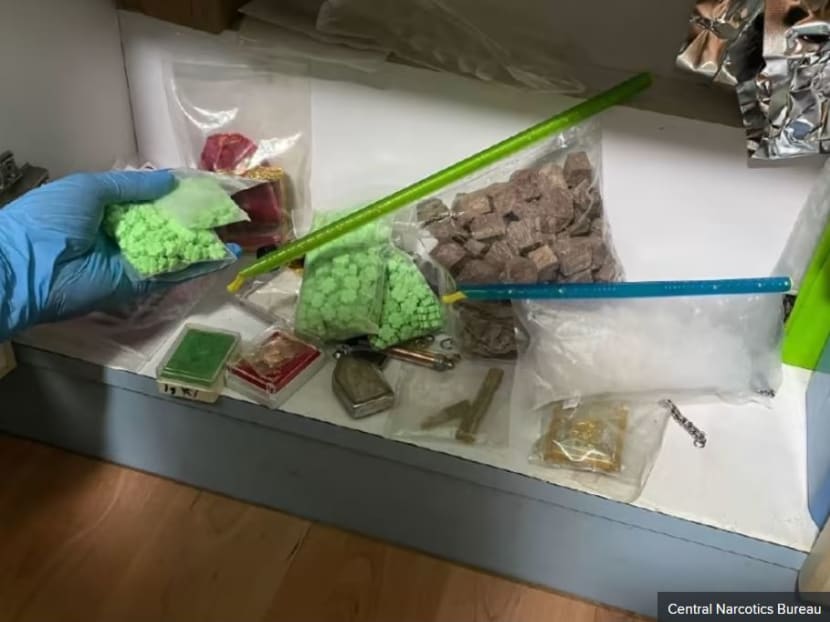MHA proposes expanding definition of illicit drugs to tackle rise in psychoactive substance abuse
SINGAPORE — The way in which illicit drugs are classified may be changed to help authorities and legislation keep pace with psychoactive substances that have been proliferating at an unprecedented rate.

Some of the controlled drugs seized at a Punggol Field home during an anti-narcotics operation on Feb 21, 2023.
- Proposed amendments to the Misuse of Drugs (Amendment) Bill were tabled in Parliament on Feb 24
- If passed, psychoactive substances will be classified based on their capacity to produce a psychoactive effect, rather than the current classification by chemical structure
- This comes amid an increase in the number of people abusing psychoactive substances
- MHA said that drug syndicates are becoming "increasingly adept" at changing chemical structures of existing substances to circumvent the law
- Another amendment to the Bill includes harsher penalties for those possessing large quantities of selected drugs
SINGAPORE — The way in which illicit drugs are classified may be changed to help authorities and legislation keep pace with psychoactive substances that have been proliferating at an unprecedented rate.
Proposed amendments to the Misuse of Drugs (Amendment) Bill, which were tabled in Parliament on Friday (Feb 24), will allow psychoactive substances to be classified based on their capacity to produce a psychoactive effect, rather than the current classification by chemical structure.
The Ministry of Home Affairs also tabled another Bill — the Constitution of the Republic of Singapore (Amendment) Bill the same day — which together with amendments to the Misuse of Drugs Act will give the Central Narcotics Bureau (CNB) powers to take action against illicit activities involving psychoactive substances that are not yet listed as controlled drugs.
Psychoactive substances are defined as substances of abuse — either in a pure form or preparation — that are not controlled by the international drug control conventions but may pose a public health threat.
Such substances mimic the effects of controlled drugs such as cannabis and heroin and when consumed or administered into one's system affect one’s mental functioning or emotional state.
MHA said in a press release on Friday that drug syndicates are becoming "increasingly adept" at altering chemical structures of existing psychoactive substances in order to produce new forms which are not controlled under international and local laws.
This is "worrying" and has been a challenge for law enforcement agencies around the world, it said.
This leads to a lag between the time a new form of psychoactive substance is first detected and the time the substance is listed by CNB.
During this period, enforcement and prosecutorial actions cannot be taken against these abusers, resulting in such substances proliferating at an unprecedented rate.
"As traffickers and abusers now switch very quickly to new forms of psychoactive substances that have yet to be listed as controlled drugs, the authorities are always playing catch-up," said MHA.
About 235 psychoactive substance abusers were arrested every year between 2018 and 2022, compared to just 11 in total between 2014 and 2017, said MHA.
Under the amended Bill, unlisted psychoactive substances that have legitimate uses or are controlled under other regulatory frameworks will be excluded.
These include products such as poppy seeds, tobacco, alcohol and those containing caffeine.
An accused person can also invoke a defence if the psychoactive substance is intended to be used for a legitimate purpose other than for human consumption, said MHA.
PROPOSED HARSHER PENALTIES FOR THOSE POSSESSING LARGE QUANTITIES OF SELECTED DRUGS
Another amendment to the Bill also includes harsher penalties for those possessing large quantities of selected drugs.
MHA said that the current sentencing framework for drug possession does not "sufficiently account for the potential harm" that could be caused by persons with large amounts of drugs in their possession.
"A more deterrent punishment is necessary," it said.
Caning, for example, will be introduced for the possession of large amounts of controlled drugs which are deemed to be more dangerous and harmful.
If the Bill is passed, the punishments will also be tiered according to the type and weight of the controlled drugs found in a person’s possession.
For instance, a person found trafficking less than 10g of diamorphine may be jailed up to 10 years, fined up to S$20,000 or both.
However, if an individual is found trafficking more than 15g, he or she may be jailed between 20 and 30 years, and receive 10 to 15 strokes of the cane.
The drug types, which include opium and morphine, are those that cause the most serious harms locally, MHA said.











